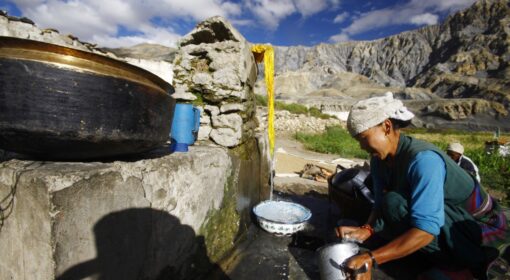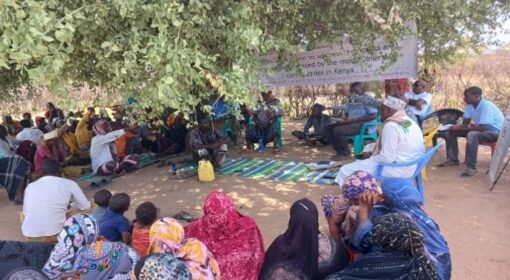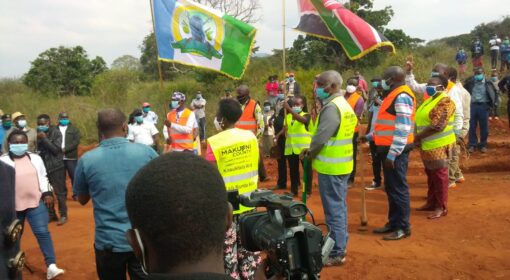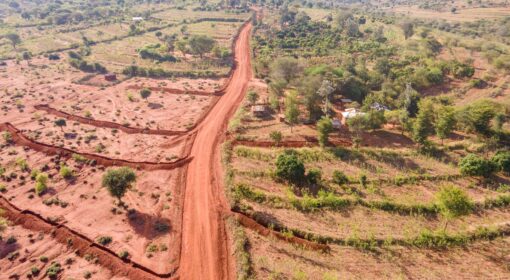By Peter Lengurnet, RESTORE project Manager, IMPACT Kenya, hub in the Reversing the Flow programme
This blog is part of a dossier on locally-led adaptation, featuring insights and lessons from the Reversing the Flow (RtF) program. RtF empowers communities in Bangladesh, Burkina Faso, Ethiopia, Kenya, and Sudan to build climate resilience through direct funding and a community-driven, landscape approach.

About RESTORE project: ‘Learning of direct financing implementation’ with the communities
My name is Peter Lengurnet, working with IMPACT Kenya as the RESTORE-RTF Project Manager. The project is undertaken in two wards in Laikipia County (Mukogodo West and Mukogodo East) and Burat ward in Isiolo County. In these wards, the pastoral communities depend on pastoralism as the main source of livelihoods. However, climate variations destabilizes and threatens their livelihoods, leaving them vulnerable. As a hub, our role is to facilitate the process, while the community groups (such as the women, youth, Ilmamusi CFA, community lands and Isiolo Gender Watch) take a lead in designing, planning and implementing their priorities interventions. This however takes time and needs honest discussions.
After the project was approved in October 2022, the first step was the baseline meetings. In these meetings, community groups and stakeholders at landscape level identified challenges and prioritized interventions to improve their landscape, people’s wellbeing and animals. The proposed interventions are largely on water, land restoration, livelihoods support, protection of Mukogodo Forest and putting in place mechanisms for community led coordination and monitoring of interventions. From January to June 2022, community groups led their conversations and consultations to self-organize themselves. The end result was consensus on the groups and interventions to be given funds. In July 2023, IMPACT invested Ksh. 7.4 M to 8 community groups in Mukogodo East and West to undertake their interventions. Receiving the funds from IMPACT, the above groups refined their plans and we co-created the interventions together. Importantly, the community groups had their own local contributions (financial or labour) to ensure that the interventions are completed and sustainability measures put in place. During and after implementation of the interventions, community groups had visited each other to learn and exchange ideas on the challenges faced and how best to improve their work.
The first phase of community projects informed the other groups on how best to do their interventions. Different stakeholders (like the Netherlands Embassy in Kenya and RVO team) including also RTF hubs in other parts of the world visited the communities to learn from them. In this case communities also learnt and got feedback from different sources on how to improve the local led interventions. The second phase started in January to June 2024. IMPACT this time supported 16 groups with KSh. 29.016 Millions with interventions (such as water, livelihood support and coordination). We are yet to learn from this phase.
Apart from direct financing aspect, communities did also participate in the policy processes at the County and international levels. At the County level, community groups engaged the county ward committees on Financing Locally-led Climate Action (FLLoCA) to leverage on funds with the ongoing interventions. At the international level three community members (from Musul, Olokirisiai and Natum) took part of the Community-Based Action (CBA) 18 conference in Arusha. They shared their learnings and got feedback on their locally led interventions.
Our experience so far is that communities know the extent to which climate change has impacted them negatively. They also know how they can address them using their traditional knowledge approaches. When they encounter challenges along the way, they learn from each other and find solutions by themselves.
As a hub we have learnt on how to give out power to communities and let them drive their own destiny, with minimal supervision. This however needs a change of mind set and trusting communities in their work. I see this as a journey where communities, hubs and partners need to undertake to realize the vision of locally led interventions for communities and by communities themselves.
A word from inter-ward RESTORE project chairperson: community coordination and monitoring perspectives
I am Jane Rennu Meshami, the chairperson of inter-ward committee for the RESTORE project. As the project started, we were selected by our community groups in Mukogodo West, East and Burat wards to support the coordination and monitoring of interventions. At the designing level of interventions, our work was to select and approve the groups and interventions to be supported under RESTORE project. At the implementation stage, we have visited all the groups supported last year and also this year to make sure that they resolve issues arising and encourage them to be fully responsible of their interventions. In Mukogodo East, communities are doing eradication of invasive species (Mayianat), extension of water to villages (Olokirisiai, Osirwa), sand dam construction (Ilgwesi). In Mukogodo West ward, communities are implementing various activities such as land restoration (CFA Ilmamusi, Nkiloriti, Kijabe, Musul), livelihood support (Natum women group) and water piping extension to villages (Tiamamut). In Burat, community groups have started their work on policy influencing, water interventions and monitoring.
As a committee, we have seen the impacts of this project; places where invasive species were removed, the grass grew and communities have reserved them as the grazing areas in dry period. The water interventions have assisted more families to have water for their home use and for their animals and wild life. We have seen that communities are capable of working for themselves when they receive the support they need. The project has also enhanced unity among the communities as they visited each other and worked together, and this assisted in stabilizing peace. On behalf the committees, I would like to thank Netherlands Government (RVO) and IMPACT Kenya for supporting and believing in our communities.
Women perspective on livelihood support
My name is Mary Sarioyo. I come from a group called Natum and I am the secretary. Our women do a number of activities, which include bee keeping, kitchen garden farming, monthly saving of money and loaning the members to support their families. We also make and sell soaps and we own a cultural Manyatta (centre). We have been part and parcel of RESTORE project since 2022 and we were lucky to be selected this year to receive KSh. 1 Million to support our work.
When we received the money in our bank account, we had several meetings to plan ourselves and agree on how to use them. We made a decision to divide the money for the savings and loaning and purchased solar panels to light our cultural centre. The rest of the money supported the water piping to our garden in the cultural Manyata where we now grow vegetables to boost our food basket. With the availability of loans to the women, each member can access small loans to purchase the household needs such as food, school fees and other household needs. As women, this gives us dignity to support our husbands to raise our families. At the end of the year, we shall collect the interest of the loans that we shared among ourselves and share as a group. All the members who took loans will bring back the funds they took as loans and then new members will take the loans. In this way, we are able to address needs of our families especially during the drought period where food scarcity and water scarcity is common.
Policy advocacy at the CBA 18 – Arusha Tanzania; A Youth perspective
My name is Jackson Nkaiduri from musul community, Mukogodo West. I assist my community as a manager of the community project supported by RESTORE funds. Musul was among the communities who benefited from RESTORE funds whereby my Community prioritized land rehabilitation. Our land had degraded leading to insufficient grass for our livestock and soil erosion. Musul has so far received 2 million Kenya shillings in phase one (2023) and phase two (2024) to rehabilitate more than 100 acres of land. This has led to a positive impact to our land where even our neighbours admired the implementation of our work. This year l was chosen to represent my community in the Community Based Adaptation Conference in Arusha, Tanzania. I have learnt a lot of things as we interacted with other people—from other parts of the world. We exchanged ideas on how communities can manage the donors funds and how partners can support their work. It was a big challenge since many of the participants still didn’t believe that communities can manage the funds and used them efficiently to address their challenges. With the knowledge I received from the conference, I am actually using it now to make the situation better in my community and I am ready to share with others to transform our society. I advocate for communities to be funded directly since they have the capacity to manage the funds and through this model, they own their intervention



